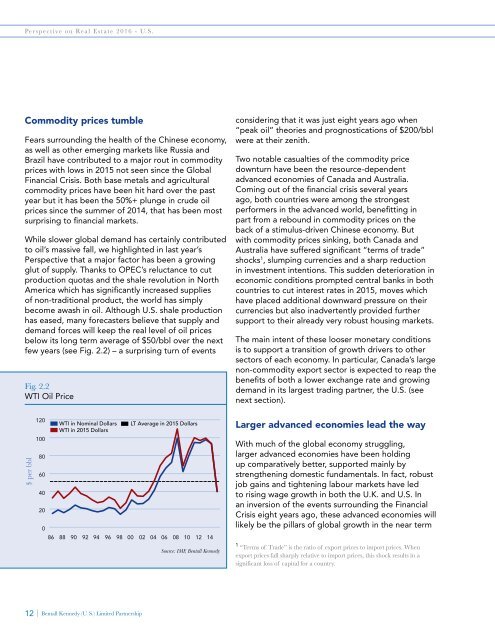BK Perspective Real Estate USA 2016
Create successful ePaper yourself
Turn your PDF publications into a flip-book with our unique Google optimized e-Paper software.
<strong>Perspective</strong> on <strong>Real</strong> <strong>Estate</strong> <strong>2016</strong> - U.S.<br />
Commodity prices tumble<br />
Fears surrounding the health of the Chinese economy,<br />
as well as other emerging markets like Russia and<br />
Brazil have contributed to a major rout in commodity<br />
prices with lows in 2015 not seen since the Global<br />
Financial Crisis. Both base metals and agricultural<br />
commodity prices have been hit hard over the past<br />
year but it has been the 50%+ plunge in crude oil<br />
prices since the summer of 2014, that has been most<br />
surprising to financial markets.<br />
While slower global demand has certainly contributed<br />
to oil’s massive fall, we highlighted in last year’s<br />
<strong>Perspective</strong> that a major factor has been a growing<br />
glut of supply. Thanks to OPEC’s reluctance to cut<br />
production quotas and the shale revolution in North<br />
America which has significantly increased supplies<br />
of non-traditional product, the world has simply<br />
become awash in oil. Although U.S. shale production<br />
has eased, many forecasters believe that supply and<br />
demand forces will keep the real level of oil prices<br />
below its long term average of $50/bbl over the next<br />
few years (see Fig. 2.2) – a surprising turn of events<br />
Fig. 2.2<br />
WTI Oil Price<br />
$ per bbl<br />
120<br />
100<br />
80<br />
60<br />
40<br />
20<br />
0<br />
WTI in Nominal Dollars<br />
WTI in 2015 Dollars<br />
LT Average in 2015 Dollars<br />
86 88 90 92 94 96 98 00 02 04 06 08 10 12 14<br />
Source: IMF, Bentall Kennedy<br />
considering that it was just eight years ago when<br />
“peak oil” theories and prognostications of $200/bbl<br />
were at their zenith.<br />
Two notable casualties of the commodity price<br />
downturn have been the resource-dependent<br />
advanced economies of Canada and Australia.<br />
Coming out of the financial crisis several years<br />
ago, both countries were among the strongest<br />
performers in the advanced world, benefitting in<br />
part from a rebound in commodity prices on the<br />
back of a stimulus-driven Chinese economy. But<br />
with commodity prices sinking, both Canada and<br />
Australia have suffered significant “terms of trade”<br />
shocks 1 , slumping currencies and a sharp reduction<br />
in investment intentions. This sudden deterioration in<br />
economic conditions prompted central banks in both<br />
countries to cut interest rates in 2015, moves which<br />
have placed additional downward pressure on their<br />
currencies but also inadvertently provided further<br />
support to their already very robust housing markets.<br />
The main intent of these looser monetary conditions<br />
is to support a transition of growth drivers to other<br />
sectors of each economy. In particular, Canada’s large<br />
non-commodity export sector is expected to reap the<br />
benefits of both a lower exchange rate and growing<br />
demand in its largest trading partner, the U.S. (see<br />
next section).<br />
Larger advanced economies lead the way<br />
With much of the global economy struggling,<br />
larger advanced economies have been holding<br />
up comparatively better, supported mainly by<br />
strengthening domestic fundamentals. In fact, robust<br />
job gains and tightening labour markets have led<br />
to rising wage growth in both the U.K. and U.S. In<br />
an inversion of the events surrounding the Financial<br />
Crisis eight years ago, these advanced economies will<br />
likely be the pillars of global growth in the near term<br />
1<br />
“Terms of Trade” is the ratio of export prices to import prices. When<br />
export prices fall sharply relative to import prices, this shock results in a<br />
significant loss of capital for a country.<br />
12 | Bentall Kennedy (U.S.) Limited Partnership


